How to Make a Chatbot: Technologies & Business Benefits
Today, over 1.4 billion people worldwide interact with chatbots on a regular basis.
The use of chatbots is beneficial for both businesses and customers. They can reduce operational costs by up to 30%, provide 24/7 service and improve user experience. According to the study, by 2025 the global market for conversational AI will be $13.9 billion.
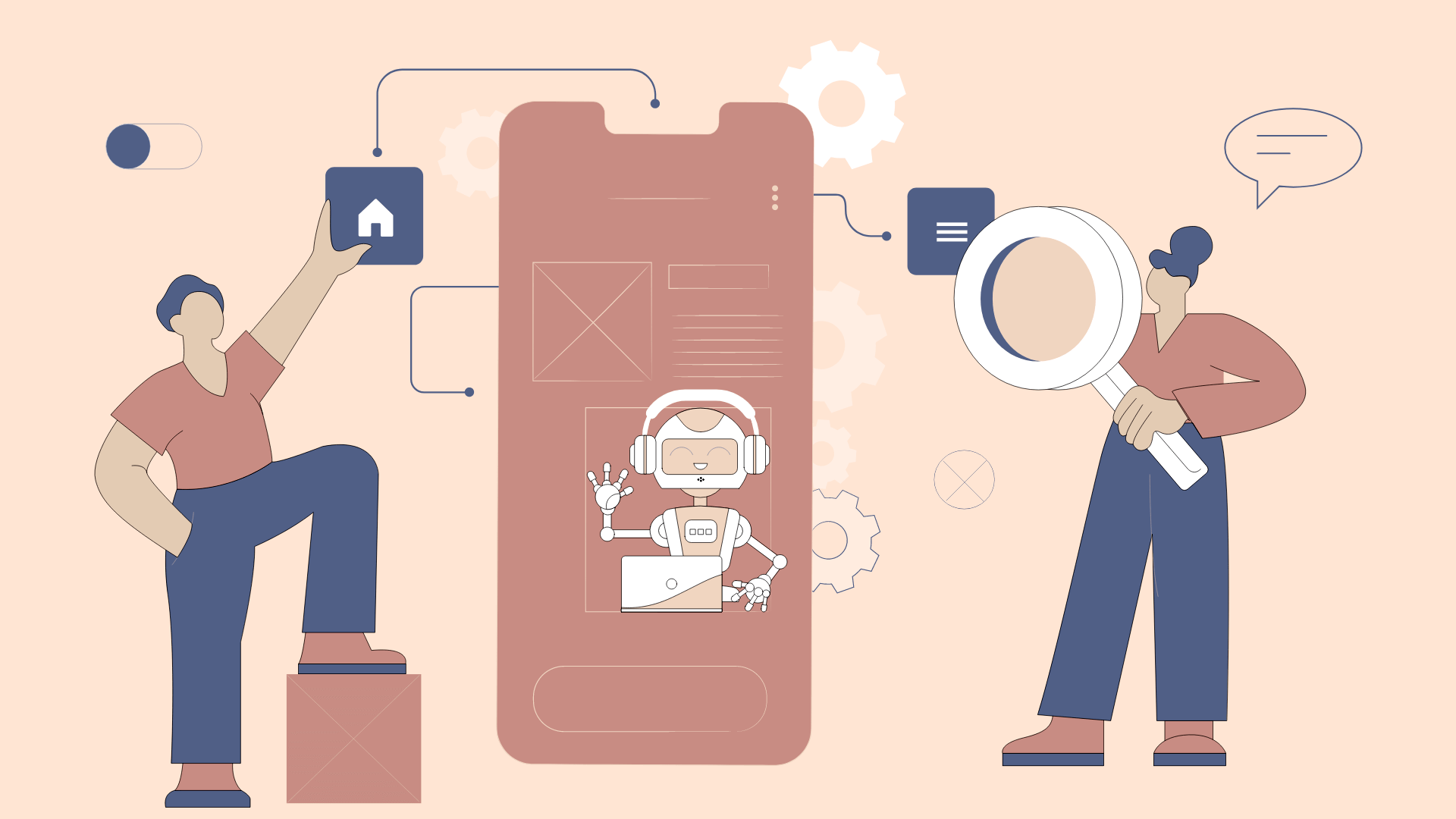
This article will explain how to build a chatbot from scratch and cover the following topics:
- How chatbot creation benefits businesses
- Types of chatbots and how to choose the right one for your business
- Two approaches to building a chatbot
- The technology stack used for chatbot development
- Detailed process to make a chatbot
Let’s find out why build a chatbot today and how to make an AI chatbot.
Benefits of Chatbot Development Business
Chatbot is software that can simulate and process conversations (written or spoken) with a user in natural-like language. Chatbots can be used in mobile applications, messaging apps, websites, social media, etc. The interaction with a chatbot is similar to communication with a real person.
Before we move on to the tech part explaining how to make a chatbot, take a look at the key benefits that a business can get thanks to chatbot implementation:
- Increasing customer engagement
Using chatbots can help avoid unnecessary information so that customers can stay in touch for longer. With consistent responses and fast response times, bots will always drive customers to your brand.
2. Attracting potential customers
Your business can use chatbots to generate leads. Bots can automatically attract customers with personalized messages.
It helps:
Improve Lead Qualification – Bots qualify leads by asking relevant questions and directing them to the sales team.
Improve Lead Engagement - Subsequently, qualified leads will be engaged based on your bot's scenario.
3. Reduce customer service costs
Implementing chatbots is an investment that helps businesses optimize customer service costs. Investing in chatbots saves additional costs for operators.
Chatbots can help reduce customer costs on multiple levels:
- Wage
- Education
- Infrastructure
During peak hours, chatbots can be scaled at no additional cost. As such, they bring tremendous value to your business by reducing costs and helping to increase revenue and customer satisfaction.
4. Tracking customer data
Chatbots are a great tool for tracking consumer behavior analysis. Using this data, companies can expand the scope of their activities.
5. Use of conversational marketing
Conversational marketing uses the power of real-time communication to help buyers move up the sales funnel. This allows your business to create authentic experiences and build relationships with customers.
When brands use chatbots for marketing, they can interact with people through targeted messages, thereby increasing their conversion rate. Developing a conversational marketing strategy has many benefits:
- Drive more leads – Your business will drive more leads when it gives visitors the opportunity to start a conversation right on your site or messenger, rather than forcing them to fill out forms.
- Personalized responses – With chatbots, brands can easily answer customer questions.
- Improving the customer experience - The goal of conversational marketing is to reduce the frustration that customers experience when dealing with customer service.
6. Meeting customer expectations
Customers prefer seamless interaction and expect quick responses to complaints or queries. Brands can use bots to meet expectations by providing a friendly experience.
7. Easy scalability support
When a business can easily scale customer support, it means it's ready for traffic growth during the holiday seasons or peak hours. A chatbot helps to take some of the load off operators and not overload them even with a strong increase in the number of requests.
8. Smoother customer journey
Losing leads halfway down the sales funnel is a frustrating situation. There are many reasons why customers might opt out of a purchase, whether it's a complicated checkout process or hidden costs.
Chatbots can be effective in helping brands reduce churn and make their journey to purchase smoother.
Companies can use chatbots to improve the buying process on many levels:
- You can offer additional information about products, services, or delivery that can clear up doubts and make the buyer's journey easier.
- Use interactive content such as videos to provide more information and gain the trust of potential customers.
- Chatbots are always a great help in providing discounts and offers so that customers can find value in the marketing funnel.
As you can see, the reasons why businesses are wondering how to build a chatbot from scratch are numerous. However, the chatbot development process is a complex one requiring deep technical knowledge.
How to Build a Chatbot from Scratch: Types & How They Differ
It’s impossible to build a chatbot from scratch without knowing their main types and how they differ. This section of the article explains what AI chatbot development is and how it can benefit your business.
Rule-Based Chatbots
Rule-based chatbots are the most basic solutions used for answering simple questions. Users interact with such bots by clicking on predefined questions that lead to the desired answer. The chatbot provides answers from the decision tree.
If you want an example, take a look at Facebook Messenger. The platform allows businesses to perform automated customer support by providing buttons with possible inquires and automatically providing answers.
While such chatbots are comparatively easy to build, they are prone to providing wrong answers and are quite limited in functionality. In some cases, they can frustrate customers by providing wrong answers.
You can see how rule-based chatbots work in the image below.
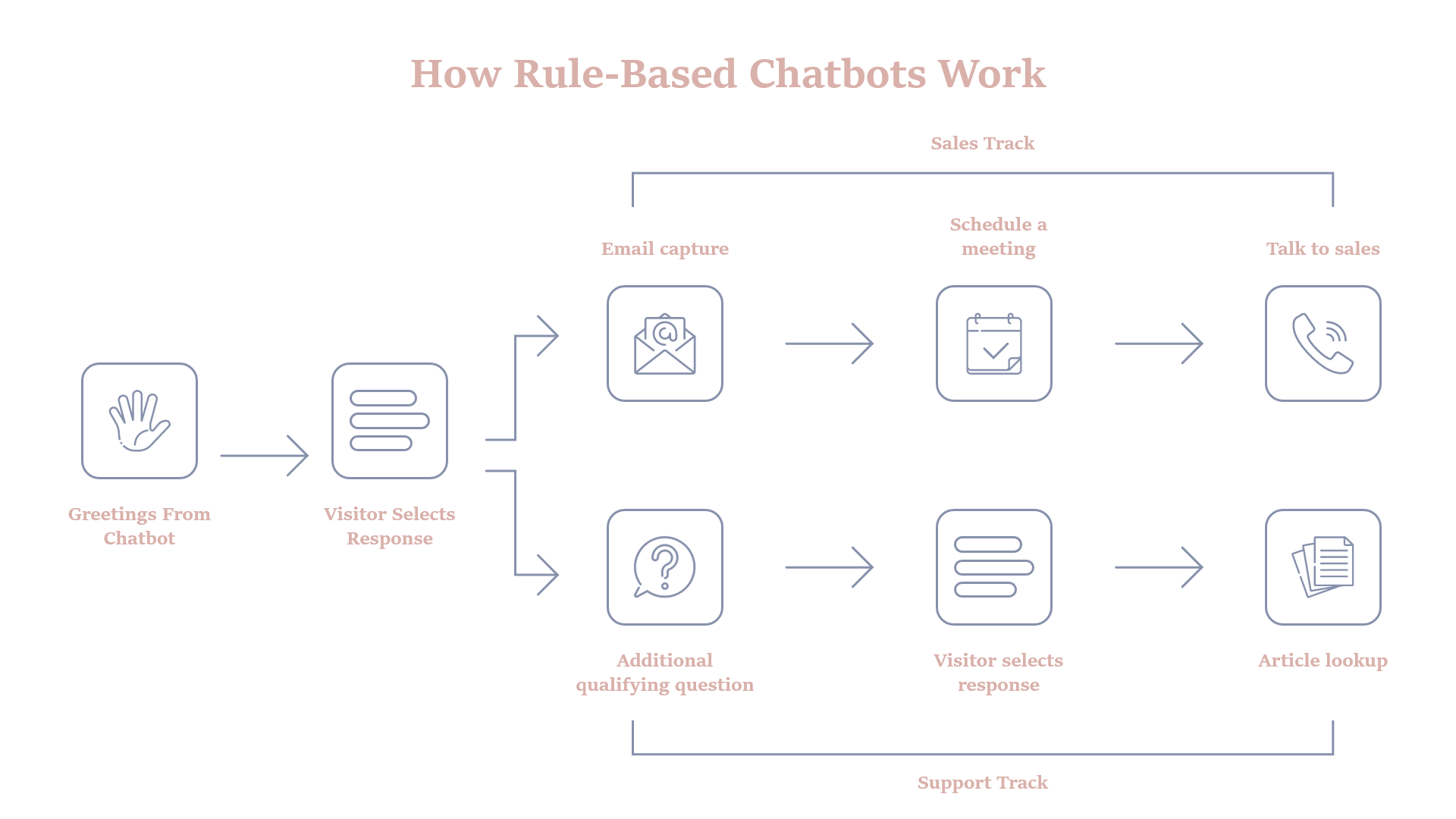
AI-Based Chatbots
AI-based chatbots are also called conversational chatbots or natural-processing chatbots. Such bots rely on Artificial Intelligence chatbot algorithms and machine learning to process user inputs and provide highly personalized answers relevant to the content.
Interaction with AI-based chatbots happens by writing questions in the human language. The bot is able to identify different questions written by a human.
After a user types in a question, the bot identifies the user’s intent, asks additional questions if needed, and provides answers using the dialogue tree to specify what problems a user has and how they can be addressed.
You can see how AI-based chatbots work in the image below.
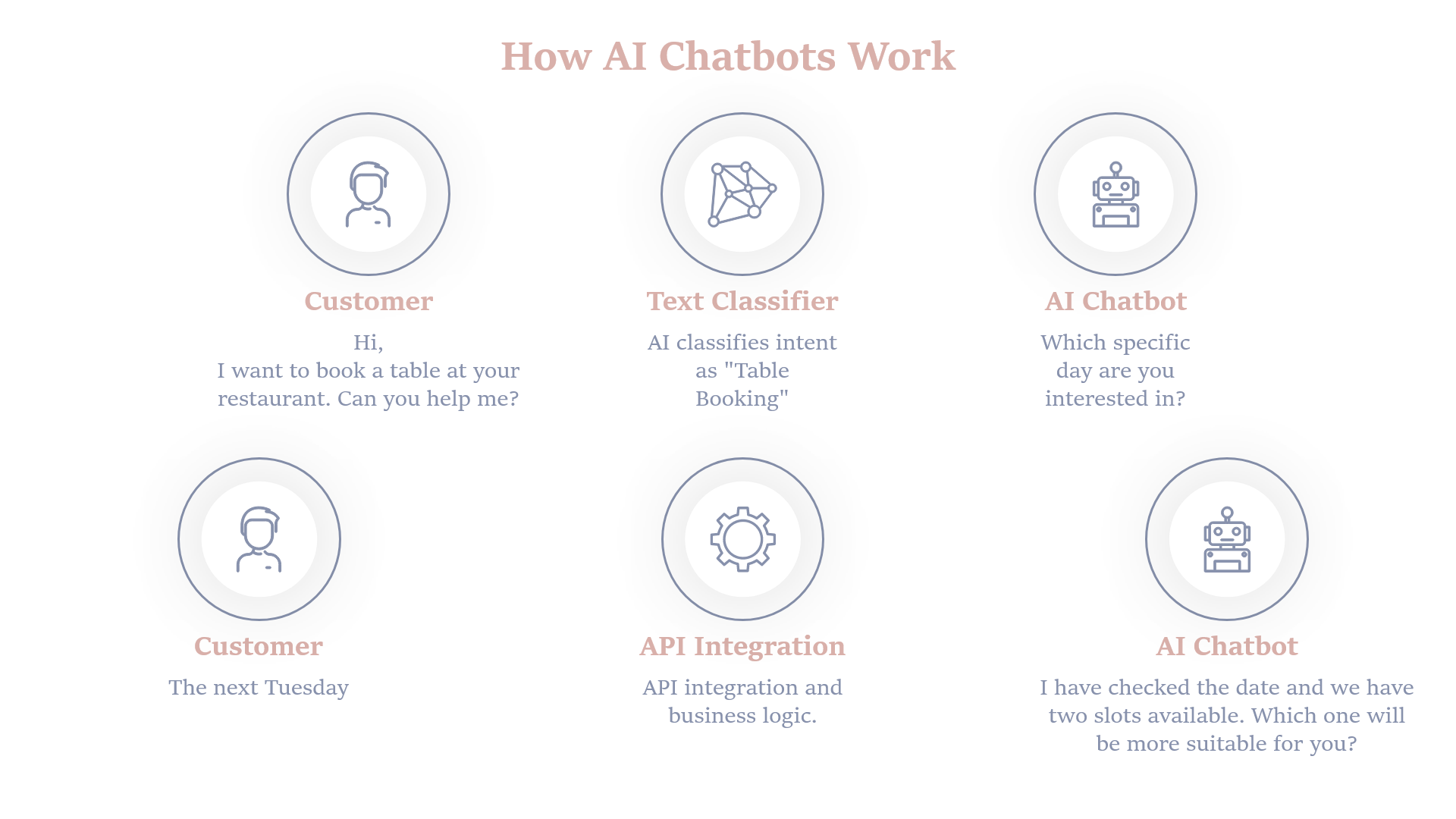
Which Chatbot Type to Choose for Your Business
You are probably wondering which type of chatbots to use for your business. The answer fully depends on your business needs and objectives.
Rule-based chatbots are usually used for two purposes:
- To collect contact details to set a call or a meeting later
- To provide basic customer support
AI-based chatbots are more advanced in terms of functionality. They can be used to perform the following tasks:
- Handle simple requests
- Process natural language (NLP)
- Provide personalized answers
- Confirm user intent
- Execute transactions on the behalf of customers
- Keep conversations natural
- Form sentences by itself
How to Make a Chatbot: Two Approaches
Chatbot development can be approached in two different ways. Let’s explore how to make a chatbot to meet all your business requirements.
Do It All by Yourself
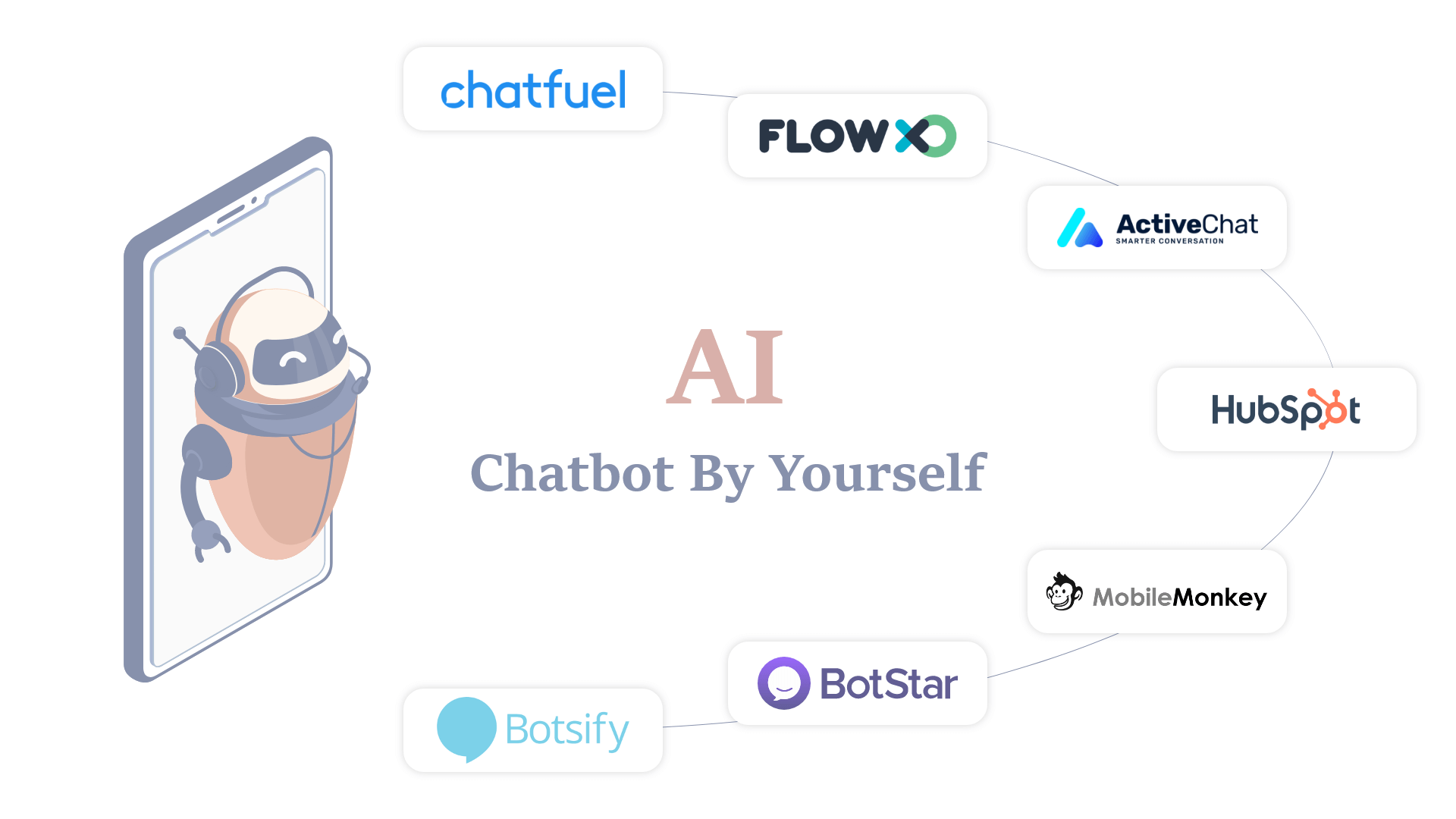
Today, you can create a chatbot free of charge if you do all the work yourself. This approach is suitable if you have the needed technical knowledge and require the simplest solution.
There are numerous chatbot development platforms that require a different level of technical expertise. Some are easier to use while others are more complicate although they provide a wider range of features.
The below table shows some of the most popular solutions. Check them out if you are wondering how to make a chatbot without the help of professionals.
| Solution | Short description | Pros | Cons | Price |
| Chatfuel | Check this solution if you’ve ever wondered how to make a chatbot for Facebook and its Messenger. Use this tool to create rule-based bots that can share updates automatically and collect useful data. | Easy-to-use interface Ready-to-use chatbot elements Built-in live chat integration Robust analytics Out-of-the-box analytics Integration with Zapier, Integromat, DiglogFlow, Google Sheets | Facebook Messenger chatbots only No built-in AI | Free plan for up to 50 subscribers Paid plans starting at $15/month |
| Botsify | One of the chatbot development tools that supports a number of channels, including websites, Facebook Messenger, Slack, and SMS. The solution allows to create a human-like conversational experience for users. | Multiple channels support Human-like conversations with users Growth users for higher user engagement | Difficult to use Can’t be connected with Facebook Ads | 14-days free trial Paid plans $49-$499/month |
| Flow XO | Chatbot creation platform for websites, mobile apps, and social media. It’s comparatively easy to use and provides pre-built templates. | Ease of use Multi-channel support Built-in live chat | Minimal analytics No integration with third-party solutions | Free plan for up to 500 interactions
Paid plan at $19/month (additional bots, active flows, and interactions are bought separately) |
| HubSpot | Among other services, HubSpot allows to make chatbots on its platform. However, its features are pretty limited. | Easy chatbot interactions Built-in live chat The ability to customize the style of the website widget | Lack of features No built-in AI Facebook Messenger and website chatbots No connection with Facebook Ads No Analytics | Free trial and free plan
Paid plans starting at $46/month |
As you can see, multiple solutions can be used to make a chatbot online. If you decide to choose this path, remember that you will need to do everything yourself and the result might not turn out the way you wanted and needed for your business.
Hire a Professional Chatbot Development Company
If you want to know how to build a chatbot from scratch, you will need to look for a professional company specialized in chatbot architecture design and development. When working with a professional company, you get a number of benefits:
- You will work with a company that knows how to make an AI chatbot
- You don’t need to have deep technical knowledge
- You can create a chatbot designed for your specific business needs
- You are not limited by the limitations of chatbot development platforms
In the next sections, we’ll explain how to choose the right vendor for chatbot development and how to circumvent some expensive mistakes.
Technology Stack to Build a Chatbot from Scratch
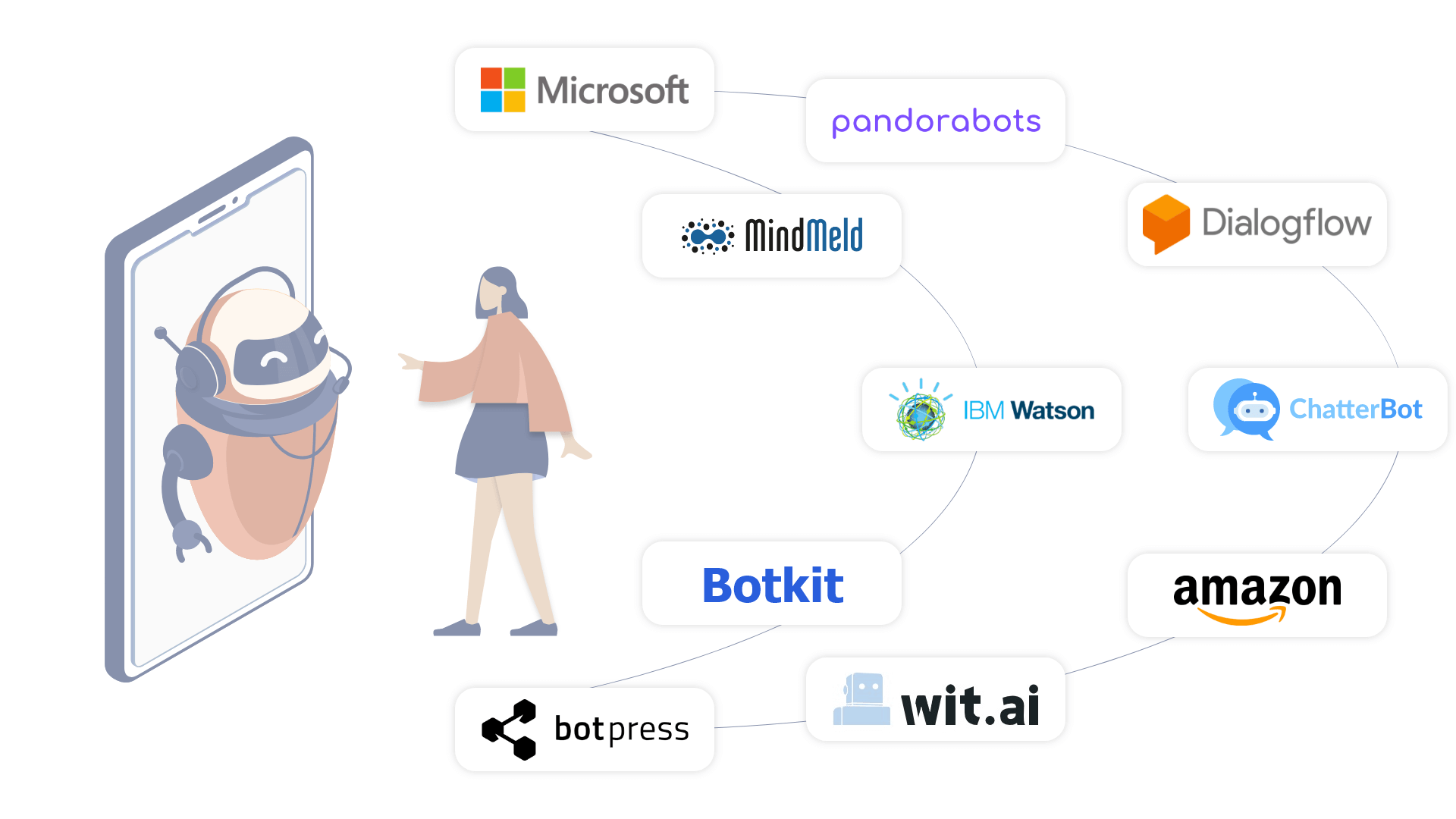
Despite the ease of use, chatbot development platforms don’t provide a lot of features that you can use to build a chatbot. In case the provided capabilities don’t meet your business needs, you might need to choose custom chatbot creation.
There are a number of solutions that can be used to build a chatbot from scratch. Let’s review some of the most promising solutions available on the market.
| Solution | Short Description | Programming language | NLP Support | Key features | Integrations |
| IBM Watson | A popular solution for customer chatbot creation with built-in AI. The solution can be used to create chatbots for a number of platforms, including messaging apps and websites. | Java, C++ | Yes | Advanced and capable machine learning engine Automated predictive analysis Cloud data storage for maximum security and privacy 10+ supported languages | Facebook Messenger Intercom Slack WordPress site |
| Microsoft Bot Framework | A set of services that allows to create and connect intelligent bots that are able to talk, listen, and communicate with users. | NodeJS, C# | No | SDKs for multiple programming languages Speech to text feature based on machine learning Multilingual support | Skype Slack Facebook Messenger Website Cortana Microsoft team Kik |
| BotKit | An open-source platform with a number of useful libraries and plugins that provide additional features, statistics, and metrics | NodeJS | No | Simple and easy to use Active community and great documentation Fast building bots High customization Integration with the most popular platforms | Slack Cisco Webex Cisco Jabber Microsoft Teams Facebook Messenger Twilio SMS Twilio IPM Google Hangouts |
| Dialogflow | AI chatbot framework with machine learning capabilities, NLP, and integration with popular communication platforms | NodeJS | Yes | Voice-based and text-based assistance Rich conversations using natural language SDKs for 14+ platforms 20+ languages support Sentiment analysis IoT integration support | Facebook Messenger Google Assistant Slack Telegram Viber Line Twilio Alexa Cortana Kik |
| Amazon Lex | A solution that allows to build conversational interfaces using voice and text. Equipped with machine learning and NLP capabilities. | Java, .Net, Ruby | Yes | Automated speed recognition Full integration with AWS High scalability SDKs for multiple platforms Free for AWS users | Facebook Messenger Slack Kik Twilio SMS |
| Wit AI | An open-source chatbot framework with NLP support and human-level intelligence. | Python | Yes | Ease of use with Facebook Messenger Large and active developer community One of the best NLP engines SDKs for iOS, Node.js, Python, Ruby 80+ languages support | Mobile apps Websites Slack Facebook Messenger Wearable devices IoT |
There are a number of other frameworks and APIs that you can use, for example, Botpress, BotKit, ChatterBot, Pandorabots, MindMeld, Luis, and many more. If you wanted to know how to make an AI chatbot, check the solutions with the support of AI, machine learning, and NLP.
How to Build a Chatbot from Scratch: Step-by-Step Guide
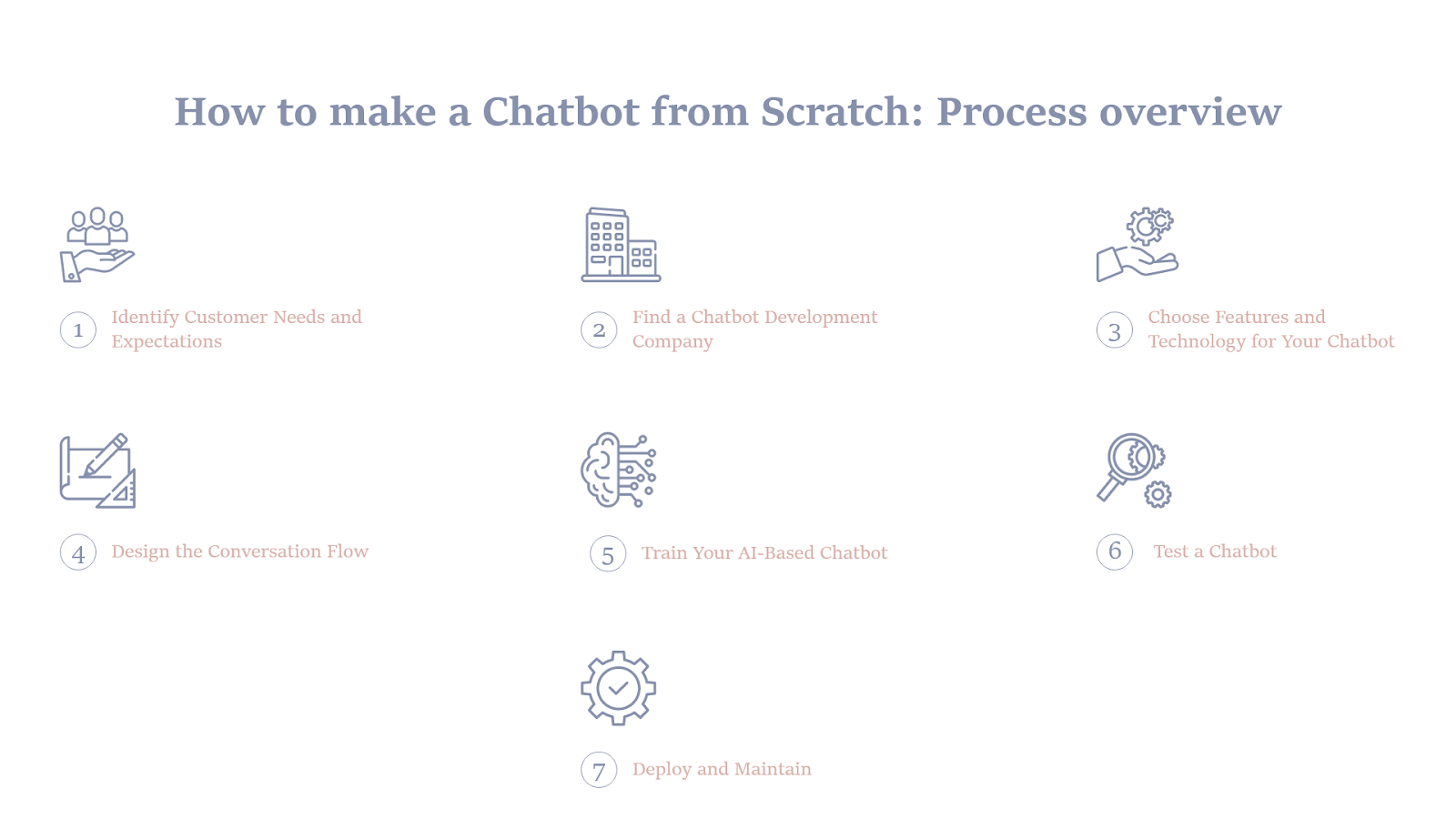
In this part, you will learn how to make a chatbot step-by-step. This guide will help you do everything right and avoid costly mistakes for business.
Let’s investigate the key processes involved in custom chatbot development and steps to build a chatbot.
Step 1: Identify Customer Needs and Expectations
The main goal to make a chatbot from scratch is to improve user experience. At this stage, you need to identify customer expectations and align them with business
The analysis of customer needs will help you come up with a list of possible features for your future chatbot. For example, you have a restaurant application, your users might be interested in knowing available reservation time.
Step 2: Find a Chatbot Development Company
This step is probably the most important in the whole journey. You need to find a company that knows how to make an AI chatbot and has previous relevant experience. The below action plan will help you make the right choice and choose the best chatbot development company that will be able to create a highly customized solution for you.
Here is what you will need to do:
- Identify prospects
Start with finding professionals providing chatbot development services. While it’s possible to hire freelancers for the job, consider the option of working with a professional software development company. Cooperation with a company involves fewer risks since the company won’t disappear into the waters without delivering your chatbot. Outsource companies also have multiple specialists who can be of use for your project. You can always use such platforms as Clutch, TopDevelopers, ITFirms, etc. to find prospects there.
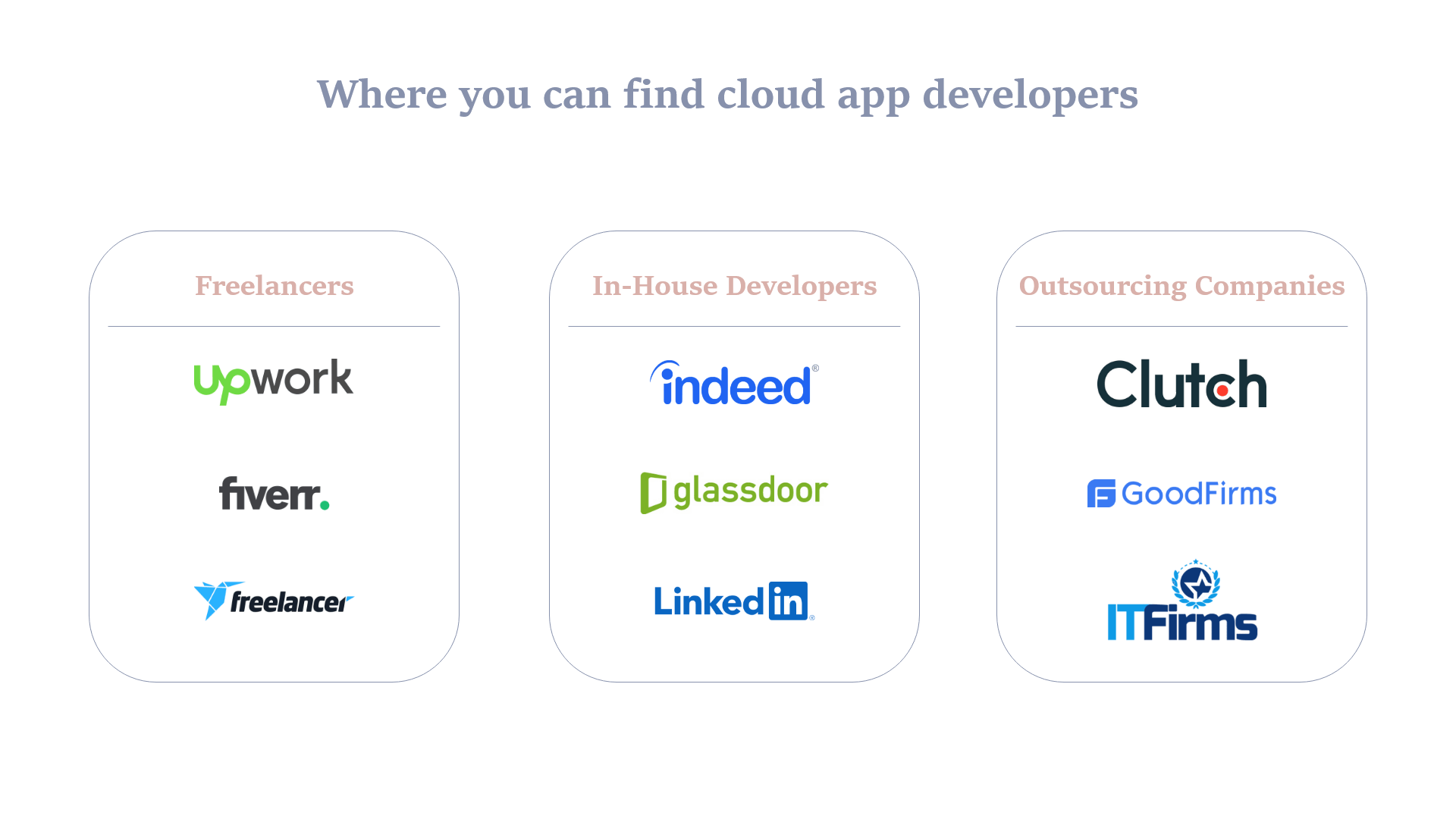
- Check the portfolio
The portfolio of the company might not include a chatbot, since such solutions are often developed as a part of a bigger project – an app, for example. As a starting point, you can single out the companies that have previous experience with mobile app development, artificial intelligence, and machine learning – technologies used to build a chatbot from scratch.
- Check reviews
Such platforms as Clutch provide reviews of the companies. You can check them on the platform or take the investigation a step further and reach out to the existing clients of your prospect to get their review straight from the source.
- Get in touch with prospects
Reach out to the selected companies to talk about their experience, provided services, cooperation model, etc. consider the geographical region and any cultural difference that might interfere with your cooperation.
- Ask the right questions
Learn about the services the company provides, how they can help you with chatbot creation, whether they have previous experience with natural language processing and how they usually work on projects as your own one.
As a result of this step, you need to have a company that will create a chatbot for you.
Step 3: Choose Features and Technology for Your Chatbot
If you want to know how to make a chatbot that will improve user experience, start with identifying the features that can help them move forward in their customer journey. Below, you can find a list of some key features that you need to consider:
- Seamless cross-channel communication
If your company is active across different platforms like an app, a website, social media, you need to provide a seamless and unified user experience across all of them.
- Rich messaging
Your chatbot needs to support different types of content. Aside from answering with plain text, it needs to have the functionality to share links, useful articles, or even to help find products.
- Integration with third-party systems
You can integrate the chatbot with a number of third-party solutions and systems such as CRM, accounting systems, marketing analytics, payment gateways, etc.
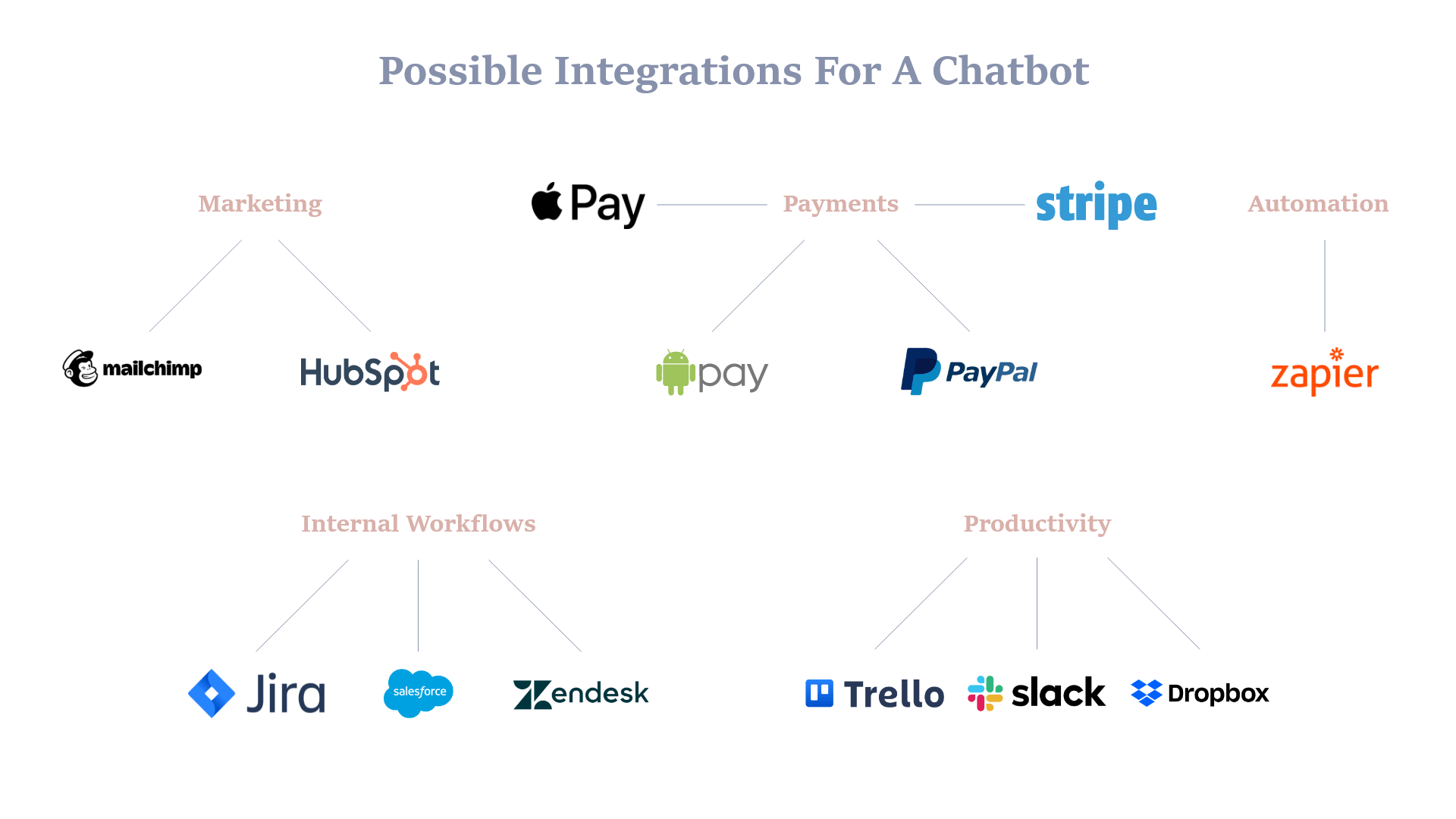
- Human handoff
In some cases, even the smartest AI chatbots can’t help users with an issue or question. Such scenarios need to include the automatic handoff of the conversation to your employees.
- Accessibility
Modern systems allow building highly accessible chatbot solutions with the support of voice messaging, zoom in, support for screen readers, etc.
- Security
Depending on the industry you operate in, a chatbot needs to meet the security standards and such regulations as HIPAA, PCI, etc.
- Advanced analytics
Chatbots generate a lot of data that you need to be able to analyze. It can be either integrated with one of the third-party analytics systems via API or has built-in analytics tools.
Step 4: Design the Conversation Flow
A professional development company will know how to make a chatbot and design the conversation flow. While using chatbot building platforms, you are limited in the choice of possible conversation formats. You can only choose, drag and drop ready-to-use blocks with answers.
When you will be working on chatbot script creation, you need to keep it close to the topic and the purpose of the chatbot. You should aim for conversation flows that will allow customers to communicate naturally with your chatbot.
Step 5: Train Your AI-Based Chatbot
This step is only necessary if you decide to build a chatbot AI project. Before you launch it, you need to train it on a massive data set, such as support tickets, email, etc. You can also get a third-party data set with the information that your chatbot needs to know. If you work with a software development vendor, it will take on this part of the process on and you won’t need to worry about it.
Step 6: Test a Chatbot
Before you launch the chatbot, you might want to test it with a few users to see how they’ll interact with it and how it will meet their intent. Chatbot testing differs from classic software testing since here you need to foresee even the most unpredictable scenarios and specify how the chatbot will react to them, for example when users ask questions not related to your business.
Step 7: Deploy and Maintain
The work on chatbot doesn’t end with its deployment. You can use the collected information and statistical data to refine answers and conversational flows to make your chatbot even more useful for customers.
How to Make a Chatbot: Final Thoughts
The development of a chatbot is not a simple process that requires the understanding of modern technologies and how to align them with business requirements.
Now that you know how to make a chatbot, you can start looking for a company that will help your chatbot idea into a project.
If you need the assistance of professional developers, Addevice is here to help you. We have years of experience working with Artificial Intelligence and machine learning and know how to create an AI bot of any complexity.
Chatbot Development, How to Make a Chatbot, Make a Chatbot, Social Media App, AR, eLearning App Development, App Like TikTok, IT Outsourcing Services, Foldable Smartphones, Booking App Development, Foldable Devices, Mobile App Development
Do You Need to Build a Chatbot for Your Business?
Unlock the power of automated conversations with your own chatbot
Our Expertise Covers:
✅ NLP for human-like interactions
✅ Integration with various messaging platforms
✅ Customizable features for your specific needs
Table of contents
FAQ
Custom chatbot development is a process that consists of a few steps:
- Identification of customer needs and expectations
- Finding a chatbot development agency
- Choosing features and technology stack
- Designing the conversation flow
- Training an AI-based chatbot
- Chatbot testing
- Deployment and support
There are numerous technologies that you can use for chatbot creation. If you are wondering how to make a chatbot with the simplest set of features, take a look at ready-to-use chatbot platforms such as Chatfuel, Botsify, Flow XO, HubSpot, etc. If you want to build a chatbot from scratch, such APIs and frameworks as IBM Watson, Microsoft Bot Framework, BotKit, DialogFlow, Amazon Lex, Wit AI, and others are at your disposal.
Template-based chatbots have limited functionality and, in most cases, are rule-based solutions. If you want to have a chatbot highly customized for your requirements or a bot built with AI and machine learning to process natural language, you will need to opt for custom chatbot development.
You can find a company that will help you with chatbot development by following the below plan:
- Identify prospects by visiting such platforms as Clutch, ITFirms, TopDevelopers, etc.
- Check the portfolio of the selected companies.
- Check reviews provided by both current and former clients.
- Get in touch with prospects to discuss your project and learn more about companies.
- Ask the right questions and make the best choice.
If you need help with chatbot building, you can always get in touch with us.
The benefits of chatbots for business are numerous, including better customer experience, faster purchase process, personalized services, 24/7 customer support, reduced cost of customer support, customer data mining, and optimization of back-office operations.
A chatbot is software that simulates and processes conversations with users in natural-like language. Chatbots can be used in mobile applications, messaging apps, on websites, on social media, etc. Bots interpret the words given to them by a person and provide pre-set answers.




 TOP 8 trip planning apps 2024: Best trip organizers for you
TOP 8 trip planning apps 2024: Best trip organizers for you
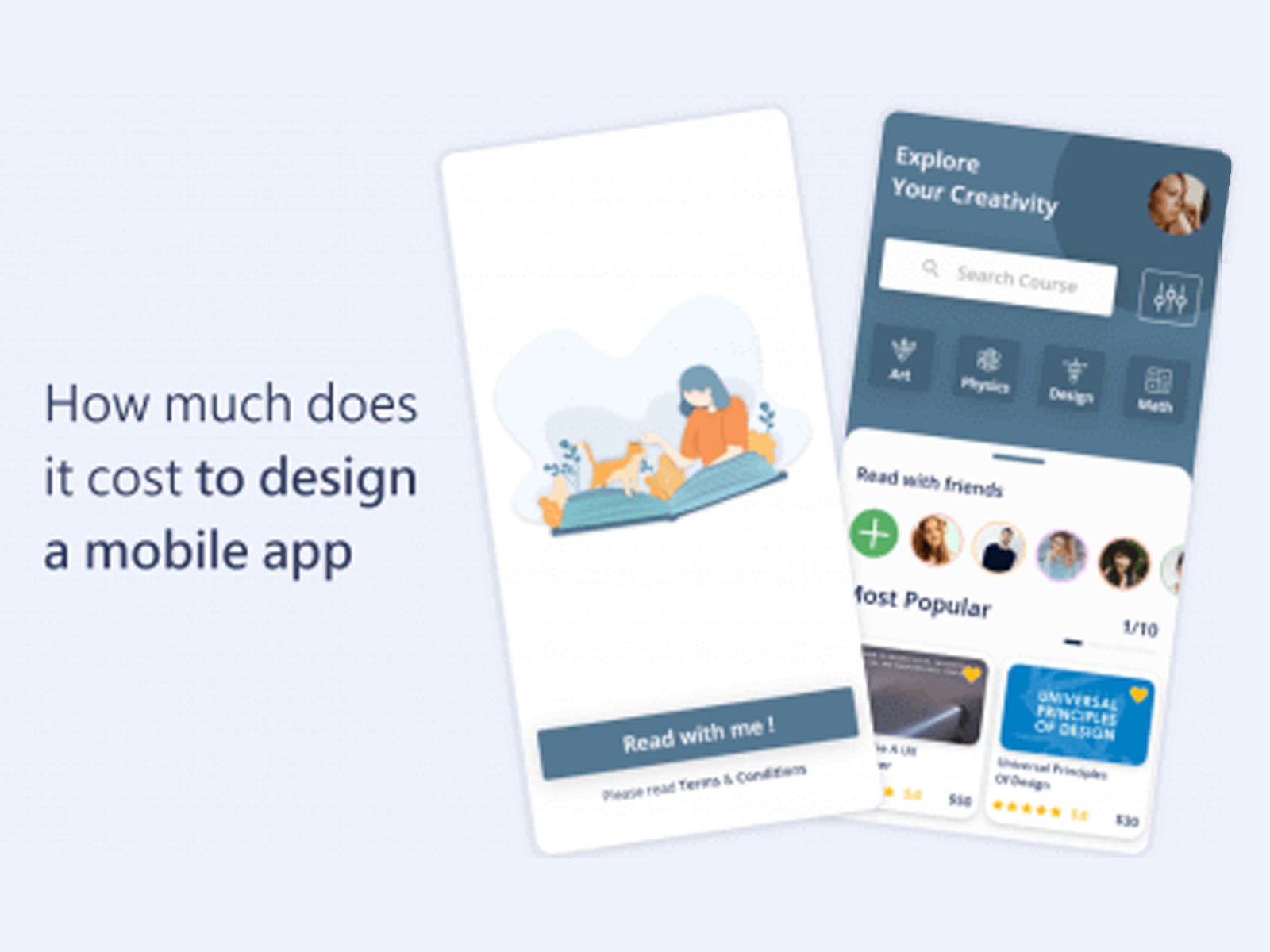 How Much Does It Cost To Build An App For your business In 2024
How Much Does It Cost To Build An App For your business In 2024
![How to Create a Workout App: Detailed Guide [Business & Tech]](png/63f7286077982_how%20to%20create%20a%20workout%20app.png) How to Create a Workout App: Detailed Guide [Business & Tech]
How to Create a Workout App: Detailed Guide [Business & Tech]